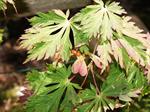
Develop Your Horticulture Skills & Knowledge
This fully immersive course covers a wide range of horticulture subjects. There is a focus on the sciences and management so it is well suited to those who have aspirations for managerial type roles or who would like to get involved in research and development. The broad nature of the studies make it applicable to a range of fields.
Improve your capacity to work in jobs such as: Garden Company Manager, Parks Manager, Technical Officer, Marketing Manager, Garden Designer, Nurseryman, Consultant, Teacher, Broadcaster, Garden Writer.
- Enrol at any time, study at your own pace, study online from any country.
- Excellent support from an international team of highly qualified and experienced horticulture tutors.
This course is designed for those wanting to take the next step in developing their horticultural career, laying a sound foundation in maintaining an ornamental garden. Learn the science and cultural practices required to establish and maintain plants to achieve optimum growth.
DURATION: 2,500 hours minimum nominal duration. Being a self paced learning program, the student can study at a rate according to their ability and capabilities. This course may be studied over 3 years or less on a full time basis, or up to 8 years on a part time basis.
ENTRY REQUIREMENTS: There are no academic prerequisites for this course but it is expected that successful applicants have achieved an educational level that will enable the completion of the course objectives.
Entry to this course is based on:
- A person with 5 years industry experience
- Year 12 or equivalent standard of education
- Mature age student
Modules
Note that each module in the Qualification - Advanced Diploma in Horticulture (Ornamental Horticulture) is a short course in its own right, and may be studied separately.
Dealing With Problems in the Garden
There are lots of things that can go wrong in an ornamental garden; but just as many things that can go right.
If you understand the science and cultural practices that underpin plant growth; you have a foundation for knowing what plants need; and in turn a starting point for ensuring they get the conditions they need for optimum performance.
A good ornamental horticulturist must know these things; and have the organisational skills and foresight to see what needs to be done ahead of time and ensure it is done.
Consider managing frost in the garden.
New plantings in particular will be frost or cold sensitive. Start thinking about preparing for winter in autumn, when the soil is still warm. In spring the plants will get moving quickly; by summer they’ll be fully established and better prepared to survive the heat and dry.
Most frost-tolerant plants can be put in the ground at any time of the year; but are still better planted at a time when they are going to grow for a few months as soon as they are planted. If a plant grows a little immediately after planting; it will settle and overcome the shock of planting. If it is planted at a time when temperatures are low, and no growth occurs; it will be more susceptible to adverse conditions, including disease attack, and frost damage.
Don’t plant evergreens in very cold, dry areas with prolonged periods of heavy frosts; wait until spring when the frosts have finished.
Frost-tolerant Plants include:
- Conifers – especially European and North American conifers
- Most herbaceous perennials and bulbs – these have a winter dormancy
- Deciduous plants – potted plants can be put in the ground now; bare-rooted plants won’t be available in nurseries until midwinter
- Lawn grasses – cool season grasses, eg. Bents, Fescues
- Frost-hardy evergreens – there are many frost-tolerant species and varieties. Check the plant label or ask the nursery staff for advice on the degree of tolerance.
Hardy evergreens:
Acacias – many spp., including A. iteaphylla, A. boormannii, A. pravissima, but use frost guards in the first winter
Arbutus
Buddleia
Buxus
Callitris
Camellias
Ceanothus
Cotoneaster
Diosma
Eucalyptus – many species, esp. E. pauciflora (Snow Gum), E. nicholli, E. scoparia
Gordonia
Grevillea – many species, including G. ‘Canberra Gem’, G. rosmarinifolia, G. alpina
Hebe
Holly
Mahonia
Nandina
Philadelphus
Pieris – needs shelter from cold (and hot) winds
Prostanthera – most species but use frost guards
Pyracantha
Rhododendrons – many varieties
Viburnum
Can Citrus be Planted in Autumn?
Yes, in mild climates autumn is a reasonable time to plant citrus. Citrus tolerate light frosts, many to around minus 2 degrees celsius; though they prefer protection. In areas with moderate frosts, wait until spring, plant in a sheltered position and use a frost guard the following winter.
Planting Tips when frosts are a possibility
- Dig organic matter into the soil several weeks before planting.
- Plant into moist soil and keep watering the plant until the cold weather starts.
- Don’t fertilise the plants until spring. Fertilising encourages new shoots that are very prone to frost damage.
 Helping Plants Survive Frost
Helping Plants Survive Frost
- Plant in protected areas – in front of a sun-facing wall, under trees, on slopes, near paving or buildings
- Turn the sprinkler on before dawn – this stops the frost settling on the plants
- Use stone or gravel mulches that retain heat
- If plants are bitten by frost, don’t cut off the damaged parts. This can encourage new, tender shoots that are vulnerable to frost.
Protecting Plants from Frost
Any barrier that stops the frost settling on the plant is useful.
Try these:
- tree guards – make a guard from hessian wrapped around stakes, or use plastic tree guards (available from garden centres, hardware shops and rural suppliers).
- milk/drink cartons, cardboard boxes or plastic drink bottles – cut the base off and place them over seedlings
- cloches – glass, plastic or cloth covered frames used to protect seedlings. NB. Don’t remove the guard too early – late frosts can cause the most damage.
